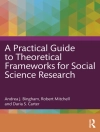Readers will be introduced to the three core approaches of counselling, coaching and mentoring, and shown how they work across a variety of settings, including therapy, teaching, social work and nursing.
Part 1 takes readers through the theory, approaches and skills needed for helping work, and includes chapters on:
- The differences and similarities of counselling, coaching and mentoring
- Foundational and advanced skills for effective helping
- Supervision and reflective practice
- Ethical helping and working with diversity
Part 2 shows how helping skills look in practice, in a variety of different helping professions. 10 specially-written case studies show you the intricacies of different settings and client groups, including work in schools, hospitals, telephone helplines and probation programs.
表中的内容
Part I: Theory, Approaches and Skills
Helping Roles and Professions: Defining the Terms
A Helping Model: Counselling, Coaching and Mentoring
Foundation Skills for Effective Helping
Advanced Skills for Effective Helping
Skills in Context
The Reflective and Reflexive Helper
The Ethical Dimension of Helping
Working with Diversity
Supervision and Continuing Professional Development for Helpers
Part II: Roles in the Helping Professions
Case Study 1: ′Annie′, contributed by a learning support assistant in a mainstream secondary school
Case Study 2: ′Maggie′, contributed by a life-coach in private practice
Case Study 3: ′Caller′, contributed by a telephone helpline counsellor
Case Study 4: ′Diane′, contributed by an NHS community drugs and alcohol worker
Case Study 5: ′Kane′, contributed by a teacher in a children′s hospital
Case Study 6: ′Letchme′, contributed by a registered manager of a children′s home
Case Study 7: ′Amy′, contributed by a counsellor and coach therapist in private practice
Case Study 8: ′Joe′, contributed by a trainee probation officer
Case Study 9: ′Megan′, contributed by a care manager assistant
Case Study 10: ′Kanta′, contributed by a surgical nurse specialist
关于作者
Jane Westergaard is a senior lecturer at Canterbury Christ Church University. She teaches on a range of programmes specifically designed for students who plan to engage in employment with young people, but not in teaching roles. These youth support professionals include school counsellors, pastoral tutors, voluntary sector youth support workers, classroom assistants, learning mentors, careers advisers and personal advisers.












